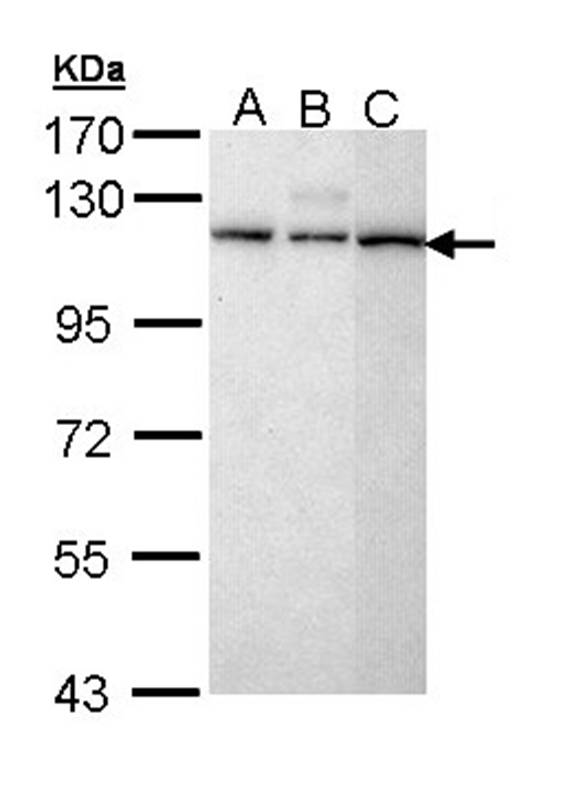Product Detail
Product NameSART1 antibody
Host SpeciesRabbit
ClonalityPolyclonal
PurificationPurified by antigen-affinity chromatography.
ApplicationsWB
Species ReactivityHu
Immunogen TypeRecombinant protein
Immunogen DescRecombinant protein fragment contain a sequence corresponding to a region within amino acids 533 and 762 of human SART1
Target NameSART1
ConjugateUnconjugated
Accession NoSwiss-Prot:O43290
Gene ID:9092
Uniprot
O43290
Gene ID
9092;
Concentration1mg/ml
FormulationSupplied in 0.1M Tris-buffered saline with 10% Glycerol (pH7.0). 0.01% Thimerosal was added as a preservative.
StorageStore at -20˚C for long term preservation (recommended). Store at 4˚C for short term use.
Application Details
Predicted MW: 90kd
Western blotting: 1:500-1:3000
Sample (30 ug of whole cell lysate)
A: H1299
B: Hela
C: Molt-4
7.5% SDS PAGE
Primary antibody diluted at 1: 5000
This gene encodes two proteins, the SART1(800) protein expressed in the nucleus of the majority of proliferating cells, and the SART1(259) protein expressed in the cytosol of epithelial cancers. The SART1(259) protein is translated by the mechanism of -1 frameshifting during posttranscriptional regulation; its full-length sequence is not published yet. The two encoded proteins are thought to be involved in the regulation of proliferation. Both proteins have tumor-rejection antigens. The SART1(259) protein possesses tumor epitopes capable of inducing HLA-A2402-restricted cytotoxic T lymphocytes in cancer patients. This SART1(259) antigen may be useful in specific immunotherapy for cancer patients and may serve as a paradigmatic tool for the diagnosis and treatment of patients with atopy. The SART1(259) protein is found to be essential for the recruitment of the tri-snRNP to the pre-spliceosome in the spliceosome assembly pathway. [provided by RefSeq]
If you have published an article using product 22397, please notify us so that we can cite your literature.



 Yes
Yes



